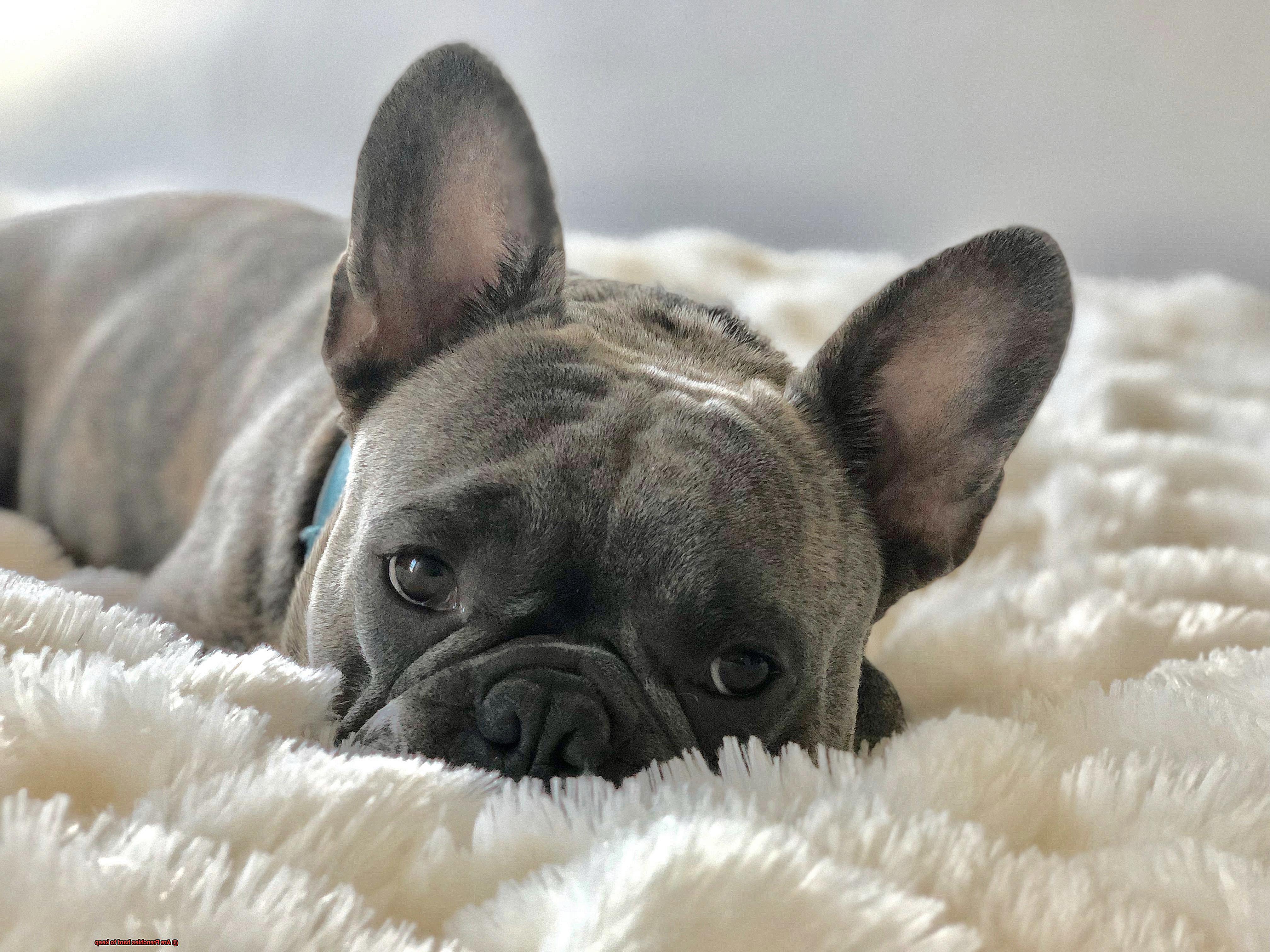Are Frenchies hard to keep?
Can we take a moment to appreciate the irresistible charm of French Bulldogs? Those wrinkly faces and adorable bat-like ears have won over hearts faster than you can say “ooh la la.” But let’s get real for a sec – are Frenchies hard to keep? Join me as we dive into the delightful world of French Bulldog ownership and uncover the truth behind their charm and challenges.
Now, if you’re a casual pet lover, you might assume that these compact cuties are low-maintenance. I mean, look at them. But let me tell you, there’s more to Frenchies than meets the eye.
First things first – those squishy faces that make them so darn cute? Well, they can also cause some respiratory issues. Yeah, it’s true. These little guys can be prone to overheating because of their unique facial structure. So keeping them cool is a must.
And when it comes to energy levels, French Bulldogs aren’t exactly marathon runners. They’re more like couch potatoes with occasional bursts of playfulness. So while they don’t need hours of exercise every day, regular walks are still important to keep them happy and healthy.
But here’s the thing – even though Frenchies might come with their challenges, their lovable qualities make it all worth it. Did you know they’re famous for being affectionate and sociable? Seriously, these dogs know how to melt hearts with just one look.
So whether you’re thinking about becoming a Frenchie parent or just curious about these furry friends, this blog series is your ultimate guide. We’ll cover everything from caring for your Frenchie to training tips and finding the perfect match for your lifestyle.
Stay tuned for our next post where we spill all the secrets on building an amazing bond with your Frenchie – guaranteed to bring you a lifetime of joy, love, and laughter.
Remember, owning a French Bulldog is like embarking on a marvelous adventure filled with surprises, rewards, and of course, lots of snuggles. So get ready for some serious Frenchie fun. See you next time, dog devotees.
Exercise Needs of French Bulldogs
Contents
- 1 Exercise Needs of French Bulldogs
- 2 The Brachycephalic Nature of Frenchies
- 3 Training a French Bulldog
- 4 Grooming Requirements for French Bulldogs
- 5 Mental Stimulation and Social Interaction for Frenchies
- 6 Advantages of Keeping a Frenchie
- 7 Common Challenges of Keeping a Frenchie
- 7.1 Health Issues: Keep Your Frenchie Fit and Healthy
- 7.2 Exercise Needs: Finding the Balance
- 7.3 Temperature Sensitivity: Keeping Your Frenchie Cool and Cozy
- 7.4 Grooming Needs: Embrace the Brushing Routine
- 7.5 Training Challenges: Patience and Consistency
- 7.6 Separation Anxiety: Easing the Stress
- 7.7 Socialization: Building a Well-Rounded Frenchie
- 8 Tips to Easily Care for a Frenchie
- 9 Conclusion
Well, you’ve come to the right place. As an expert in all things Frenchies, I’m here to guide you through their exercise needs and provide some tips to ensure they get just the right amount of physical activity without overexerting themselves.
French Bulldogs have a moderate exercise requirement, which means they don’t need as much exercise as some other breeds. This makes them a great choice for apartment dwellers or those with small yards. However, don’t let their laid-back nature fool you – they still need regular exercise to maintain their overall health and prevent obesity.
One important thing to note is that French Bulldogs are prone to overheating. Due to their adorable flat faces, they can easily become overheated during physical activities. To keep your Frenchie cool and comfortable, it’s crucial to provide them with exercise in cooler parts of the day, such as early mornings or evenings when the temperature is lower.

A daily walk is essential for French Bulldogs, but it doesn’t have to be a marathon. A 20 to 30-minute walk can do wonders for most Frenchies. However, keep an eye on their breathing and body temperature during the walk. If they start excessively panting or seem to be struggling to catch their breath, it’s best to take a break and let them rest.
But walks aren’t the only way to exercise your Frenchie. They also enjoy interactive playtime. Games like fetch or tug-of-war not only provide exercise but also mental stimulation. You can also try puzzle toys or treat-dispensing toys to keep them entertained and physically active.
Swimming is another fantastic exercise option for French Bulldogs. It’s a low-impact activity that helps them cool down while giving them a full-body workout. Just remember that not all Frenchies are natural swimmers, so proper supervision and guidance are necessary when introducing them to water.
While it’s important to ensure your Frenchie gets enough exercise, it’s equally important to prevent overexertion. French Bulldogs have a strong desire to please their owners, which may lead them to push themselves beyond their limits. As responsible pet owners, we need to set boundaries and make sure they get enough rest between activities.
It’s also worth mentioning that each Frenchie is unique and may have varying exercise needs. Factors like age, health condition, and overall fitness level can influence their exercise requirements. Consult with your veterinarian to determine the appropriate exercise routine for your specific Frenchie.
The Brachycephalic Nature of Frenchies
French Bulldogs, or Frenchies as they are affectionately known, are undeniably adorable with their unique brachycephalic skull shape. However, this distinct feature comes with a set of health implications that every Frenchie owner should be aware of.
Here, we will explore the impact of the brachycephalic nature of Frenchies on their health and lifestyle, providing valuable insights to ensure the well-being of these beloved pets.

Difficulty in Breathing:
The flat skull shape of Frenchies often leads to respiratory issues. Narrowed nostrils, elongated soft palates, and smaller windpipes can obstruct their airways, causing breathing difficulties. This becomes especially apparent during exercise or in hot weather when their compromised breathing ability can lead to respiratory distress. It is essential for owners to monitor their Frenchies closely in such situations and provide them with a cool and well-ventilated environment.
Overheating and Heat Stroke:
Due to their brachycephalic nature, Frenchies have a reduced ability to cool down efficiently. This makes them more susceptible to overheating and heat stroke. Owners should take extra precautions during hot weather or strenuous activities by ensuring adequate shade, providing fresh water at all times, and avoiding excessive exercise during peak temperatures.
Snoring:
Frenchies are notorious for their loud snoring, which is primarily caused by the reduced airflow through their narrowed airways. While this may be amusing to some, it can disrupt both the dog’s and owner’s sleep patterns. Ensuring a comfortable sleeping environment and proper weight management can help alleviate this issue.
Dental Problems:
The compacted jaw structure of Frenchies often leads to overcrowded teeth, increasing the risk of gum disease. Regular dental care, including brushing their teeth and providing appropriate chew toys, is crucial for their oral health.
Eye Concerns:
Frenchies’ prominent eyes are more exposed and vulnerable to injury or infection. Additionally, their shallow eye sockets make them prone to conditions such as corneal ulcers and dry eye syndrome. Regular eye examinations by a veterinarian are recommended to detect and treat any issues promptly.
Exercise Limitations:
While Frenchies may not require as much exercise as some other breeds, their compromised breathing ability can limit their endurance. It is important for owners to provide regular but gentle exercise to prevent obesity and keep them fit without causing respiratory distress. A daily walk and interactive playtime, such as fetch or puzzle toys, can provide both physical activity and mental stimulation.
Anesthesia Risks:
Frenchies’ unique anatomy, including their short snouts, narrow airways, and potential respiratory issues, makes anesthesia riskier for them compared to other breeds. Specialized care is required during medical procedures that involve anesthesia to ensure their safety.
Training a French Bulldog
Training a French Bulldog can be a rewarding experience, but it requires the right approach and mindset. In this section, we will explore the importance of positive reinforcement, consistency, and patience when training your Frenchie. These three elements are essential for building a strong bond with your furry friend and achieving successful training outcomes.
Positive Reinforcement: Unleashing the Power of Rewards
French Bulldogs respond exceptionally well to positive reinforcement techniques. This means rewarding desired behaviors with treats, praise, and playtime. By using rewards, you can motivate your Frenchie to repeat those behaviors in the future. Remember, harsh punishments or negative reinforcement techniques can backfire and create fear or aggression in your pup. So, stick to the power of positivity.
Consistency: The Key to Success
Consistency is crucial when training a French Bulldog. These intelligent but easily distracted dogs thrive on routine and clear expectations. Establish consistent rules and boundaries from day one, and make sure everyone in the household is on the same page. This helps your Frenchie understand what is expected of them and reduces confusion or frustration during training sessions.
Patience: Slow and Steady Wins the Race
French Bulldogs have their own unique personalities and learning styles. Some may grasp commands quickly, while others may take more time. It’s important to be patient and understanding during the training process. Avoid getting frustrated or giving up too soon. With consistent training and positive reinforcement, your Frenchie will eventually catch on to what you’re teaching them.
Training Tips for Success:
- Start early: Begin training your Frenchie as a puppy when their minds are more receptive to learning.
- Keep it short and sweet: French Bulldogs have short attention spans, so keep training sessions brief but frequent.
- Make it fun: Keep training sessions engaging and enjoyable for your Frenchie by incorporating games and interactive play.
- Socialize, socialize, socialize: Expose your Frenchie to different people, animals, and environments to help them become well-rounded and friendly.
- Crate training: Introduce crate training gradually and associate it with positive experiences to create a safe haven for your Frenchie.
- Seek professional help if needed: If you’re struggling with training or encountering specific issues, don’t hesitate to consult a professional dog trainer experienced in working with French Bulldogs.

Grooming Requirements for French Bulldogs
French Bulldogs, or Frenchies as they are affectionately called, are known for their adorable wrinkled faces and bat-like ears. These compact and muscular pups have a short and smooth coat that requires minimal grooming compared to other breeds. However, there are still important grooming tasks that should be done regularly to keep your Frenchie looking and feeling their best. Let’s dive into the grooming requirements for French Bulldogs.
- Bathing: Frenchies should be bathed every three to four weeks using a gentle dog shampoo formulated for sensitive skin. Make sure to rinse off all the shampoo thoroughly to prevent skin irritation or dryness.
- Nail Care: Regular nail trims are crucial for French Bulldogs to prevent overgrowth. If you’re not confident in trimming their nails yourself, seek help from a professional groomer or veterinarian.
- Dental Hygiene: Dental problems are common in Frenchies due to their short-nosed structure. Regular brushing with dog-friendly toothpaste and toothbrush is recommended to prevent plaque buildup and tartar formation.
- Brushing: Despite having short coats, French Bulldogs still shed, especially during seasonal changes. Regular brushing with a soft-bristle brush or grooming mitt helps remove loose hairs and keeps shedding under control.
- Ear Maintenance: French Bulldogs’ floppy ears make them prone to ear infections. Regular inspection and cleaning are necessary to prevent any buildup of wax or dirt.
- Eye Care: Frenchie’s prominent eyes can accumulate tear stains and debris. Gently wiping the area around their eyes with a damp cloth helps keep them clean and prevents irritation.
Mental Stimulation and Social Interaction for Frenchies
French Bulldogs, like any other breed, require mental stimulation and social interaction to thrive and lead a happy life. Despite their small size, these dogs have a big personality and an active mind that needs to be engaged. Mental stimulation is essential for preventing boredom and destructive behavior in Frenchies.
Interactive Toys: Keep their minds busy
- Puzzle toys challenge their intelligence and keep them entertained.
- Fill puzzle toys with treats or kibble for them to figure out how to retrieve.
- Provides mental stimulation and physical activity as they work to solve the puzzle.
Training: Exercise their minds
- French Bulldogs are intelligent and highly trainable.
- Teaching them new commands or tricks exercises their minds.
- Strengthens the bond between the dog and their owner.
- Consistency, positive reinforcement, and short training sessions are key.
Social Interaction: Prevent anxiety and aggression
- Regular socialization with other dogs and humans is crucial.
- Helps them develop good behavior and prevents anxiety or aggression.
- Daily walks or trips to the dog park provide opportunities for social interaction.
- Exposes them to different smells, sights, and sounds for well-rounded development.
- Engage in play sessions with friendly dogs involving chasing, wrestling, and fetching.
- Provides physical exercise and practice important social skills.
- Helps them read body language and understand boundaries.

Playtime with Owners: Strengthening the bond
- French Bulldogs love attention and thrive on human interaction.
- Interactive games like fetch, hide and seek, or teaching them tricks provide mental stimulation.
- Strengthens the bond between the dog and their owner.
Advantages of Keeping a Frenchie
Are you considering adding a furry friend to your family? Look no further than a French Bulldog. These adorable pups have a lot to offer and can bring so much joy and love into your life. As an expert on French Bulldogs, let me share with you the advantages of keeping a Frenchie.
- Compact Size: French Bulldogs may be small in size, but they have big hearts. Unlike larger breeds, Frenchies can comfortably fit into any living space. Whether you live in a spacious house or a cozy apartment, these pups will adapt easily and make themselves at home. Plus, their compact size means they’re perfect for urban dwellers who have limited space but still want a furry companion by their side.
- Low Exercise Requirements: If you’re not the most active person or have a busy schedule, a Frenchie might be the perfect fit for you. These dogs don’t require extensive exercise routines and are content with moderate physical activity. Short walks or play sessions in the backyard will keep them happy and healthy. So, if you’re looking for a companion that won’t demand hours of exercise every day, a Frenchie is an excellent choice.
- Affectionate and Loving Nature: French Bulldogs are known for their affectionate and loving nature. They thrive on human companionship and form strong bonds with their owners. Nothing beats coming home to a Frenchie who’s excitedly waiting to shower you with kisses and cuddles. Their affectionate nature makes them great emotional support animals or simply loving companions for anyone who craves constant affection.
- Good with Children: If you have little ones running around, a Frenchie is an ideal addition to your family. These dogs are generally good with children and have a patient and tolerant nature. They can handle the unpredictable behavior of kids and are known to be gentle and protective. You can trust a Frenchie to be your child’s loyal and loving playmate.
- Minimal Grooming Needs: Let’s face it, not everyone has the time or inclination for extensive grooming routines. Thankfully, French Bulldogs have minimal grooming needs. Their short coat only requires occasional brushing to keep it looking its best. This low-maintenance grooming routine is a blessing for busy individuals or those who prefer to spend their time doing other things.
- Adaptability: French Bulldogs are incredibly adaptable. Whether you’re a busy professional, a retiree, or a family with children, Frenchies can easily adjust to your lifestyle. They are not overly demanding and can fit into various living situations. Their adaptability makes them a versatile choice for a wide range of households.
Common Challenges of Keeping a Frenchie
You’ve fallen in love with those adorable bat-like ears and expressive eyes of a French Bulldog, and you’re ready to bring one into your home. While they may be popular for their compact size and affectionate nature, like any breed, French Bulldogs come with their own set of challenges. In this article, we’ll explore the common hurdles faced by Frenchie owners and provide practical tips to overcome them.
Health Issues: Keep Your Frenchie Fit and Healthy
French Bulldogs are prone to certain health issues due to their brachycephalic (short-nosed) structure. These include respiratory problems, allergies, skin infections, joint problems, and eye issues. Regular veterinary care, proper diet, exercise, and monitoring their environment can help mitigate these risks.
Exercise Needs: Finding the Balance
Frenchies may not require intense exercise like some breeds, but they still need regular physical activity to stay fit. However, their brachycephalic nature makes them sensitive to heat and prone to breathing difficulties. Short walks and playtime in cool environments are recommended to keep them active without putting undue strain on their respiratory system.
Temperature Sensitivity: Keeping Your Frenchie Cool and Cozy
French Bulldogs struggle to regulate their body temperature, making them vulnerable to heatstroke in hot weather. It’s crucial to keep them cool by providing shade, fresh water, and avoiding prolonged exposure to high temperatures. In colder months, consider providing extra warmth with doggy sweaters or jackets.
Grooming Needs: Embrace the Brushing Routine
Frenchies have a short coat that is relatively low-maintenance. However, they do shed moderately throughout the year. Regular brushing helps minimize shedding and keeps their coat clean and healthy. Don’t forget about their adorable facial folds – daily cleaning is essential to prevent bacterial infections.
Training Challenges: Patience and Consistency
French Bulldogs can be stubborn and independent-minded, which can make training a bit challenging. Consistent positive reinforcement methods work best with this breed. Remember, they may have a mind of their own at times, so patience and consistency are key when teaching them commands and house rules.
Separation Anxiety: Easing the Stress
French Bulldogs thrive on human companionship and can develop separation anxiety if left alone for long periods. Gradual alone time exposure, mental stimulation through toys and puzzles, and creating a safe space for them can help alleviate separation anxiety.
Socialization: Building a Well-Rounded Frenchie
French Bulldogs are generally friendly and sociable with people and other pets. However, early socialization is crucial to ensure they grow up to be well-adjusted and comfortable in various situations. Expose them to different environments, sounds, people, and animals to prevent fearfulness or aggression.
Tips to Easily Care for a Frenchie
French Bulldogs, also known as Frenchies, are beloved for their adorable faces and affectionate nature. While caring for these lovable companions requires some effort, it can be a rewarding experience. In this article, we will provide essential tips to easily care for your Frenchie, ensuring their happiness and well-being.

Grooming:
Frenchies have a short coat that is easy to maintain, but regular grooming is still necessary. Brush their coat at least once a week to remove loose hair and prevent matting. Pay special attention to their facial wrinkles by gently wiping them with a damp cloth to keep them clean and prevent infections. Additionally, clean their ears regularly to prevent wax buildup.
Nutrition:
Proper nutrition is vital for your Frenchie’s overall health. Consult with your veterinarian to determine the best diet for your dog, considering their age, weight, and any specific dietary needs they may have. Avoid overfeeding, as Frenchies can easily gain weight. Stick to a balanced diet that includes high-quality dog food and limit treats.
Exercise:
Despite their small size, Frenchies are energetic dogs that require regular exercise. Daily walks, playtime, and interactive toys are crucial to keep them physically and mentally stimulated. Be mindful of their brachycephalic nature and avoid excessive exercise in extreme weather conditions.
Start training your Frenchie from an early age to establish good behavior and obedience. Use positive reinforcement techniques such as treats or praise to motivate them. Socialize them with other dogs, people, and different environments to ensure they grow up to be well-adjusted and friendly companions.
Regular veterinary check-ups:
Regular visits to the veterinarian are essential for your Frenchie’s health. Schedule routine check-ups, vaccinations, and preventive treatments for fleas, ticks, and heartworms. Keep an eye on their weight, dental hygiene, and any signs of illness or discomfort.
Em5WE9QFfa0″ >
Conclusion
In conclusion, owning a French Bulldog can be both rewarding and challenging.
While they are undeniably adorable and have a lovable personality, their specific needs and health issues require careful attention. From their exercise requirements to their sensitivity to extreme temperatures, Frenchies demand a dedicated owner who is willing to provide the necessary care and support.
However, with proper knowledge, preparation, and commitment, keeping a Frenchie can be an incredibly fulfilling experience.




